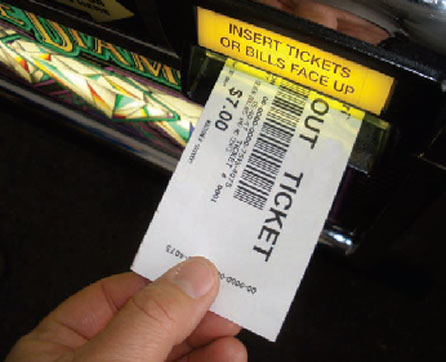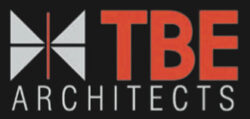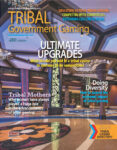
The gaming industry has always had its technological pioneers—many, like the predecessors to Caesars Entertainment and MGM Resorts International, have forged new practices that are now standard in the casino business.
But more often than not, first adopters of industry-changing technology are found in Indian Country. Indeed, the very fact of a Class II gaming product that is barely indistinguishable from its Class III cousin is testament to tribal dedication to developing technology—in that case led by the Seminole Tribe of Florida, which worked with vendors and won legal battles to develop what is now standard in Indian casinos.
“The Seminoles started with Class II, working with (Reno supplier) Sierra Design Group,” recalls Knute Knudson, vice president of Native American development for slot supplier IGT. “Those products were developed through interpretations of the Indian Gaming Regulatory Act (IGRA), and the use of effective technology really became prominent. Now, even internationally, people refer to Class II. It is uniquely tribal in its legal interpretation, but now it’s used as a product for all segments of the industry.”
He adds that Class II technology led to the development of central determinant systems such as those now used in Washington state and New York.
Knudson has been involved in Indian gaming since its start in the early 1990s, when he was vice president of Sodak Gaming, a major supplier to gaming tribes. He says as Indian gaming matured, mastering new technologies was a necessity in overcoming a number of regulatory challenges and achieving success—which, in turn, has strengthened tribal sovereignty.
Over his long career at IGT—which led to his 2021 induction into the American Gaming Association’s Hall of Fame—Knudson has had a ringside seat as new technologies have been pioneered by tribal casinos. He offers ticket-in/ticket-out (TITO) as an example. A tribal casino, the Oneidas’ Turning Stone Casino in Verona, New York, proved as early as the 1990s that a slot floor could be run without coins. The Oneidas’ deposit/carded-play system for years stood as a model of cashless casino operations.
It was no surprise, says Knudson, that when cash-out tickets were first deployed in a cash-in/ticket-out setup (to be followed by IGT’s EZ Pay ticket-in/ticket-out system), it was the tribal casino market where it occurred. “The first time I ever saw a cash-out ticket was in tribal casinos,” Knudson says. “I saw it in Southern California, I saw it in Oklahoma, I saw it in Florida. And it obviously changed the manner in which casino floors are managed.”
Electronic table games (ETGs) are another product area that matured in the tribal casino market, in states such as Arizona, Minnesota and others that initially prohibited live table games. Tribal casinos were among the first to host ETGs, in the early days utilizing video of dealers that were the precursors to today’s live-dealer ETGs.
“From the start of Indian gaming to the present, tribal governments have been leaders in the use of gaming technology,” says Knudson. “This tribal innovation has been driven by tribal government’s desire for economic self-sufficiency, and by the lack of preconceived thoughts on what worked in the past in traditional gaming.”
Buddy Frank, the longtime slot executive who last month was inducted into the EKG Slot Awards Hall of Fame, agrees that tribal casinos have always been among the first adopters of new technology. After establishing himself as a slot executive in Northern Nevada, Frank capped his career in Indian Country in California, first with Viejas Casino and finally as vice president of slot operations at Pechanga Resort & Casino.
Frank says his time at Pechanga brought many pioneering innovations, beginning with the move to electronic communication among the slots on the floor—from serial cable to Cat 5, Cat 6 and ultimately Ethernet high-speed transmission between slot machines. “That opened the door to everything else, from the video screens you see on machines today to the live bonusing and electronic tournaments,” he says.
These days, tribes are more likely to be pioneers in adopting business intelligence, data visualization and the use of artificial intelligence in host programs. There again, says Frank, Indian casinos such as Pechanga led the way. “Pechanga was a leader in first working with EMC and then Dell to build the hardware necessary to have a good artificial intelligence environment,” he says, “and then hiring people skilled in data warehousing and data analytics.”
Quick and Agile
There are any number of inherent reasons tribes have embraced new technologies. “I think it’s a mixed answer, to be honest,” says Victor Newsom, senior vice president, product management and payment solutions for Everi Holdings. “In some cases what we’ve seen is for specific initiatives, they are better positioned to be more agile. If there’s a tribal initiative, and the council is supportive and working with appropriately qualified partners, yes, they tend to move faster.”
That speed increases once a new technology catches on, he adds. “If in a market where you have many competitive properties, such as Southern California, when you start to see something catch on with patrons, then there’s a fast-follower mindset that takes over, and I absolutely will see it move much more quickly across the regions.”
Knudson says the absence of a large corporate structure, in which there is a quarterly drive to produce results for shareholders, also helps tribes move quickly to new technologies. “It’s much easier for them to make decisions,” he says. “At IGT, we’re in every market in the world, and we’re in regulated gaming segments—the scale of everything is quite large. With that, we inherently have more process when implementing new ideas.
“Tribes, on the other hand, in many instances have been through the battles to get where they are today, and had to be innovative and may be more agile when it comes to new ideas.”
Frank says the other factor that has placed tribes at the forefront of technology is the use of private testing labs like Gaming Laboratories International (GLI), BMM Testlabs and Eclipse Compliance Testing to certify new equipment, getting new products to casino floors ahead of many state-run labs.
“Almost every tribe subscribed to (the private labs),” Frank says. “Everybody says the Nevada lab was the model and the best, and they’re very good. And then Atlantic City came along and did their own, and they were decent. But GLI got input from everybody. Plus, as opposed to being government, they were for-profit and therefore they attracted better talent… Tribes got ahead of commercial casinos in technology, and some of it was really beneficial.”
But most of all, leaders of tribal casinos have been very open to new ideas, says Andrew Cardno, co-founder and chief technology officer of business software supplier Quick Custom Intelligence (QCI). “Tribal casinos have always been innovative, and among the very diverse tribal nations, I see real innovation leaders,” Cardno says. “Certainly for QCI, the tribal business partners have been right at the front of our business all the way through and are definitely willing to jump in, be great business partners and to innovate with us.”
Hot New Tech
Tribal leadership as first adopters of new technology has continued to manifest itself in today’s fast-moving tech environment, as operators across the industry examine alternatives to cash in the form of digital wallets and other new payment solutions. Business intelligence for marketing purposes has been another huge growth area, as efficient data collection solutions merge with artificial intelligence to create new efficiencies for player development executives in casinos.
John Fernandez, director of player development at California’s Morongo Casino, is one tribal operator known as an early adopter of new technologies—like the QCI Host module, which has streamlined the casino’s player development efforts.
“I’ve got a pretty good-size VIP services team, and it’s a very data-driven sales team,” Fernandez says. “But I know that most of the time, not all hosts are willing to accept the technology because they’re salespeople first, and they’re not analysts. I don’t want to turn my team into a group of analysts. They need to be salespeople first.”
The business intelligence software, in this respect, has simplified the process of utilizing data. “They like the QCI product because it tells them things like, ‘I haven’t talked to Frank in two months. It’s time to.’ And it will send them an email that Frank is here playing and, and it gives you where he is (in the casino). You’re able to go out there and see your customer right away.”
The system also provides actionable alerts in direct response to real-time play. “Without a tool like that, we have over 4,000 machines out there,” says Fernandez. “In the old days, the host would just walk around. How do you figure out who’s playing, and what they’re doing? This tool gives you all that. It tells me one of my hosts has a customer that has played 15 hours and is down $37,000 right now. A host can go out and talk to that player, and intervene (with a comp or a bonus).
“And here’s an unhosted guy that’s played seven hours and is losing $10,400. Either my host or my VIP agents, who are in the VIP lounge, will see that and assign a task to the host to run out there.”
One of the hottest new technologies these days can be found in the Acres Foundation system, which not only provides a gateway for cashless play through a digital wallet, but can draw real-time data from every slot machine on the floor, alerting marketers in real time for any number of interventions to keep the best players playing, while ensuring that they return again and again.
While some major commercial casino operators like Penn Entertainment are spreading the footprint of the Acres Foundation system, there are plenty of first adopters of the technology in Indian Country as well. One of the most recent adopters is the Rolling Hills Casino and Resort in Corning, California.
“Over the last several years, we’ve really put an emphasis on trying to leverage every ounce of technology we can get to make us better and make us more efficient,” says Steve Neely, general manager of Rolling Hills. “Acres really personifies that. What’s available today is really just the tip of the iceberg for what Acres will be able to offer us as this evolves. Foundation really does represent an ever-evolving solution to a wide array of challenges we have at the operations level.”
Neely says Rolling Hills is in the pre-installation phase, and in the coming months will begin installing Acres hardware on its 840 slot machines.
“A number of marketing benefits are in front of us,” he says. “Imagine you have a high-value player whose actual loss is trending so far away from their theoretical loss that they’re just getting crushed, and they’re going to be upset. They’re having a bad day. All of a sudden, something pops up on the screen of the slot machine and tells them to push this button to reveal your bonus, and suddenly, it’s enough to keep them interested… We don’t want our players to leave having had a bad experience.”
Another tribe known to embrace new technology is Minnesota’s Mille Lacs Band of Ojibwe. Robert Sawyer has worked with the tribe’s casino operations, Grand Casino Mille Lacs and Grand Casino Hinckley, for some 25 years. Late in 2021, when he was vice president of gaming at Grand Casino Mille Lacs, Sawyer was tapped as chief operating officer of a new Mille Lacs Corporate Ventures division called SlotCo.
SlotCo acquires slot machines for casinos from major suppliers, but also helps the Mille Lacs and other tribes get the most of all new technology arriving on the floor—including a source of capital for new technology purchases and property improvements. SlotCo also brings state-of-the-art analytics and data networking to help customers better understand patron behavior.
“SlotCo had been a development idea that came from the notion that there are early adopters of technology in the tribal world, and there are some that are maybe a little more challenged,” Sawyer explains. “Our CEO (Joe Nayquonabe) and a few others of us felt that was bad for the industry—there would be young people that would go in for their first casino experience, where they may not see brand new slot machines. They’re seeing equipment that’s 20, 30 years old on floors, and how do we change that? How do we help?
“What can we do to help, maybe bring some of that new innovation and that new technology to those more rural tribes? We came up with a model that helps do that while delivering measurable revenue growth.”
“The tribes have always been quick to move into new technology, and adopt early,” says Rolling Hills’ Neely. “On the commercial side, they’re needing to make sure that the shareholders are seeing immediate share value, immediate gains in value. And on the tribal side, the shareholders are the tribal members, and they’re looking at generations forward. So how are we making sure that the investments we are making today are going to prepare and set up the organization for the long term, not just for the immediate return?”
In the end, the early appearance of groundbreaking technology in Indian Country may come down to the structure of tribal gaming organizations. “For decision-making, there’s no giant corporate board worrying about stockholders’ profits,” comments Frank. “And that makes a difference. Moreover, one thing you would think would slow them down but doesn’t is that most tribes have a long-term view. They’re not worried about this quarter’s report. They’re worried almost about generational wealth, generational profit. It gives them the feeling that they can try stuff and move ahead. Think agile.”
“Tribal country has seen a lot of growth, and that growth is driving diversification in all the locations,” says QCI’s Cardno.
“I feel privileged and honored, and proud of how we’re able to work with tribal nations. It’s been one of my great pleasures to learn about tribal nations, and to help with economic growth and be a part of that.”

















